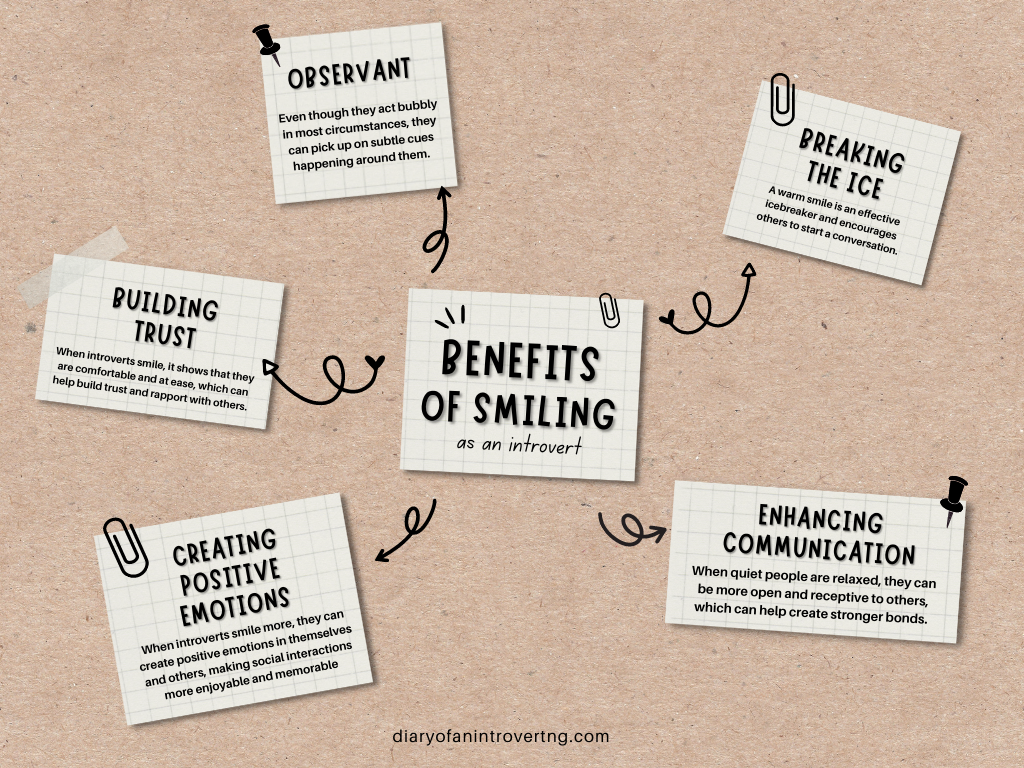5 Blissful Benefits of Smiling as an Introvert to Boost Your Mood
Photo by Samsung UK on Unsplash
Introverts often get a bad reputation for being reserved or unfriendly.
Sometimes, they may find it difficult to communicate and connect with others, which can cause them to feel anxious or lonely.
But in reality, they have many strengths, including their ability to listen and observe.
This is the reason why smiling is important
One simple yet powerful tool that introverts can use to improve their mood and connect with others is the power of a smile.
Smiling is a simple, natural facial expression that has been known to have positive effects on both the smiler and those around them.
For introverts, smiling can help break the ice and make social situations feel less intimidating.
In this article, we will explore the various benefits of smiling for introverts. We’ll also share how they can use this tool to enhance their well-being and social connections.
The Science of Smiling & How It Can Affect Your Mood.
Why is smiling important? It contributes to our overall health and well-being.
Research has shown that when we smile, even if we don't feel like it, our brain releases chemicals like endorphins and serotonin, which can improve our mood and reduce stress levels. This is the smile effect. [1]
A forced smile can have notably immediate positive effects on our emotional state.
For introverts who may be prone to overthinking or ruminating, this is a quick and effective way to shift your focus and feel better.
When we smile, our brains send signals to the facial muscles to contract, which in turn triggers the release of neuropeptides and other neurotransmitters in the brain. [2]
These chemicals help counteract the effects of stress hormones (like cortisol) that contribute to feelings of anxiety and tension.
And that's why smiles are important.
The power of a smile has such a profound effect on our mental health, making you experience increased feelings of happiness and well-being.
In addition to these immediate effects, research also shows that smiling can have long-term benefits for your well-being.
For example, a study published in the journal ‘Psychological Science’ found that people who smiled more frequently throughout their lives tended to have happier and more fulfilling lives, as well as more positive relationships with others. [3]
Other studies have found that the smile effect can help reduce symptoms of depression and anxiety, improve our ability to cope with stress, and increase our overall sense of well-being. [4]
That's why the importance of smiling can never be overstated. It’s because when we smile, our brain regulates our emotional responses and reduces negative feelings.
Interestingly, the benefits of smiling are not limited to just our own well-being.
Smiling has also been found to have positive effects on those around us. When we smile at others, we can help to reduce their stress and anxiety, increase their feelings of happiness and well-being, and even improve their immune function. [5]
Smiling has a contagious nature. So, when we see someone else smile, it triggers the same neural pathways in our brains that are associated with smiling.
This also has a positive impact on the immune system, and is one of the reasons to smile as much as possible.
Studies have found that when people smile or experience positive emotions, their bodies produce more immune-boosting antibodies, which can help protect them against illnesses and diseases. [6]
How Smiling Can Help Introverts Connect With Others.
Smiling creates a positive impression on others because it’s a universal sign of friendliness and warmth. This leads to better communication and relationship building.
The reason for smile therapy is that it can positively impact both the person smiling and those around them.
Just one smile a day can make a difference in someone's life.
So, here are some ways smiling can help introverts connect with others:
Breaking the ice: A warm smile is an effective icebreaker and encourages others to start a conversation. This is quite essential because many introverts struggle to start conversations with strangers. Nonetheless, a smile can make them more approachable. The power of a smile also encourages the other person to build a connection. Meeting someone new can be awkward, but smiling can bring an immediate sense of closeness.
Building trust: A genuine smile conveys trustworthiness and sincerity. When introverts smile, it shows that they are comfortable and at ease, which can help build trust and rapport with others. This smile benefit also makes introverts seem more open and authentic, which creates a welcoming environment for building relationships.
Enhancing communication: The smiling therapy can reduce tension and anxiety in social situations. It also creates a more peaceful environment for connections. This is especially helpful when introverts may feel uncomfortable or nervous. When quiet people are relaxed, they can be more open and receptive to others, which can help create stronger bonds.
Creating positive emotions: The importance of smiling is that it triggers the release of endorphins, which are feel-good chemicals that promote happiness. When introverts smile more, they can create positive emotions in themselves and others, making social interactions more enjoyable and memorable.
Builds confidence: It may feel uncomfortable at first, but practicing smiling regularly can help introverts feel more confident and comfortable in social situations. Smiling can become a habit, which can help some introverts build powerful social skills peradventure they couldn’t before.
Related: Am I Too Quiet? P.S. No, You’re Not. A How-To Guide to Using Your Introversion to Your Advantage
Some Practical Tips for Introverts Who May Want to Smile More But Find It Difficult.
It's important for introverts to recognize the power of smiling and why smiles are important.
Your smiles can make you appear more sociable, even if you struggle with expressing your emotions in social situations.
Smiling is a key component of communication, which has numerous physical and mental benefits.
Here are some tips to incorporate into your daily routine if you’re struggling to smile more.
Start with a small smile.
Smiling doesn't have to be a big, toothy grin. You can start with a small smile that feels comfortable for you. Practice this smile in front of a mirror or when you're alone. Once you get comfortable, you can gradually increase the intensity of your smile over time.
Research has shown that there are many smile benefits. A smiling person is often perceived as approachable by others. This can improve your social interactions and relationships.
2. Use positive self-talk.
One of the reasons introverts struggle with smiling is because they tend to have negative thoughts about themselves or the situation they are in. To counteract these negative thoughts, practice positive self-talk.
Tell yourself that you're capable of smiling, that smiling will make you feel better, and that it will have a positive impact on those around you. By reminding yourself of these smiling benefits, you can motivate yourself to practice smiling more often and reap the rewards of a happier, healthier life.
3. Focus on the positives.
When you're in a social situation and find it hard to smile, focus on the positives. Remind yourself about the benefits of smiling and how smiling is good for you.
Think about something that makes you happy or grateful, like finishing a long-awaited project, or finally getting a chance to break out of isolation and enjoy an outdoor scenery. This can make it easier to crack a smile.
4. Practice gratitude.
Gratitude is another powerful tool to help introverts smile more. Take a few minutes each day to reflect on the things you're grateful. This can improve your mood and overall well-being.
Not only does gratitude make you feel good, but it can also make it easier to show appreciation for the good things in life, and consequently smile more often. By reflecting on things like a warm cup of coffee in the morning or a supportive friend, you'll find that smiling comes more naturally.
Liking this article? Join our Introvert Club→
5. Use humor.
Humor is a great way to break the ice and make people feel comfortable. If you're in a social situation and find it hard to smile, try using humor to lighten the mood. This can be as simple as telling a joke or making a witty comment. When people are laughing, it's easier to smile and enjoy the moment.
6. Practice mindfulness.
Mindfulness means being present and aware of your thoughts and feelings. When you're mindful, you're less likely to get caught up in negative thoughts and emotions that can make it hard to smile. Practice mindfulness by taking a few deep breaths, focusing on your senses, and being in the moment. This will help you feel calmer and more centered, making it easier to smile.
7. Use positive body language.
Body language can have a big impact on how you feel and how others perceive you. If you're in a social situation, try using positive body language to convey warmth and openness. This can be as simple as uncrossing your arms, making eye contact, and leaning in slightly when someone is talking to you.
8. Practice in low-pressure situations.
If you're not used to smiling, it can feel uncomfortable at first. To build your confidence, practice smiling in low-pressure situations. This can be when you're alone, with a close friend, or in a situation where you feel comfortable. As you get more comfortable with smiling, it’ll gradually reduce the difficulty of smiling in certain outdoor situations.
9. Be authentic
Remember, it's important to be authentic when you're smiling. Don't force a smile if you don't feel like it. People can usually tell when someone is being insincere, and it can have the opposite effect of what you intended. Instead, focus on the positive aspects of the situation and let your smile come naturally.
10. Find a reason to smile.
If you're struggling to find a reason to smile, think about something that brings you joy. It could be a hobby, a favorite book or movie, a pet, or a special memory. Focusing on the things that make you happy can help you find a genuine reason to smile, which will make your smile more natural and authentic.
11. Practice relaxation techniques.
Introverts may feel anxious or tense in social situations, which can make it difficult to smile. Practicing relaxation techniques can help you feel calmer. For example, deep breathing, progressive muscle relaxation, or meditation. When you're relaxed, it's easier to smile and immerse yourself in activities.
12. Surround yourself with positivity.
The people and environments we surround ourselves with can have a big impact on our mood and behavior. If you want to smile more, surround yourself with positivity. Spend time with people who make you feel good about yourself, and avoid those who bring you down. It’s also crucial to seek out environments that are uplifting and energizing. This can be nature or places that inspire you.
FAQs
What does a smile do?
What does smiling do? It can convey positive emotions like happiness, joy, and friendliness. Smiling can also make you feel good by releasing endorphins. It improves social interactions by signaling warmth and approachability.
Why is smiling good for you?
Is smiling good for you? Sure! Smiling can have numerous benefits for your well-being. It can reduce stress, boost your mood, and even lower blood pressure. Smiling can also improve social interactions, as it signals warmth and friendliness.
Does smiling release endorphins?
Yes, research suggests that smiling triggers the release of endorphins in the brain. These are natural chemicals that reduce pain and induce feelings of pleasure and happiness. One study found that even a fake smile can produce a positive emotional response. It also increases activity in areas of the brain associated with reward and pleasure.
What is in a smile?
A smile has much social and cultural significance. It is a gesture of greeting, politeness, or acknowledgment in many different contexts. In some cultures, smiling is seen as a sign of openness and honesty, while in others, it may be viewed as a sign of insincerity or weakness.
Is smiling healthy?
Yes, smiling is healthy. Physically, it can lower blood pressure, reduce stress hormones, and boost the immune system. Mentally, it can improve mood, reduce anxiety and depression, and enhance social connections. Overall, smiling promotes good health and well-being.
Over to You…
Remember, smiling is a powerful tool for communication and can have a positive impact on your mood and interactions with others. With practice and patience, introverts can learn to smile more and enjoy the benefits that come with it. Was this article helpful? Share it and leave a comment.
-
[1] Krumhuber, E. G., & Manstead, A. S. (2013). Grin and bear it: the influence of manipulated facial expression on the stress response.
[2] Söderkvist, S., Ohlén, K., & Dimberg, U. (2014). How the experience of emotion is modulated by facial feedback. Emotion Review, 6(1), 34-39. doi: 10.1177/1754073913494895.
[3] Abel, E. L., & Kruger, M. L. (2010). Smile intensity in photographs predicts longevity. Psychological Science, 21(4), 542-544. doi: 10.1177/0956797610363774.
[4] Finzi, E., & Rosenthal, N. E. (2014). Emotional proprioception: Treatment of depression with afferent facial feedback. Journal of Psychiatric Research, 58, 155-159. doi: 10.1016/j.jpsychires.2014.07.027.
[5] Dimberg, U., Thunberg, M., & Elmehed, K. (2000). Unconscious facial reactions to emotional facial expressions. Psychological Science, 11(1), 86-89. doi: 10.1111/1467-9280.00223.
[6] Cohen, S., Doyle, W. J., Turner, R. B., Alper, C. M., & Skoner, D. P. (2003). Emotional style and susceptibility to the common cold. Psychosomatic Medicine, 65(4), 652-657. doi: 10.1097/01.PSY.0000070292.53837.CF.
Live Your Best Quiet Life
Get the Am I Too Quiet? book →














